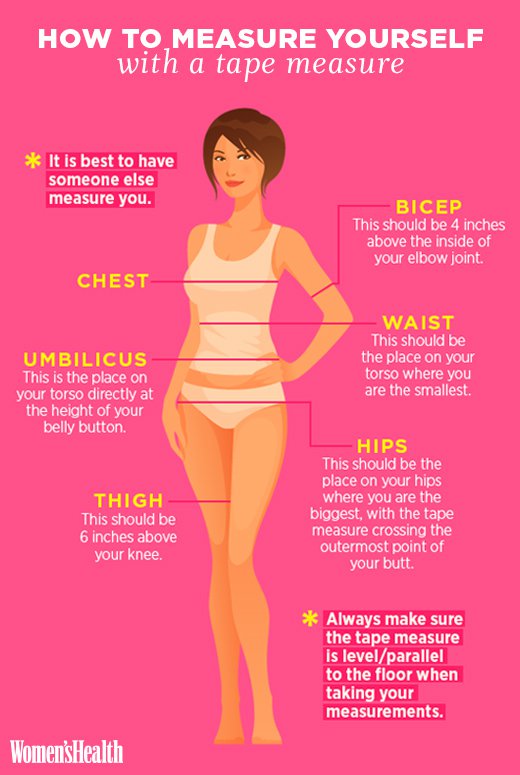This Weight-Loss Tracking Method Is More Productive (and Less Crazy-Making) Than a Scale
Stepping onto the scale can feel like the ultimate moment of truth. After loading your plate with vegetables and clocking hours at the gym, you would expect those efforts to show up on the scale. But if you’ve been doing all the right things and the number still isn’t budging, it may be time to measure your progress differently. “Sometimes your weight will stay the same even when your body’s changing,” says exercise physiologist and dietitian Cassandra Forsythe, Ph.D., R.D. That’s where using a tape measure to determine your progress is a much better plan of attack.
Why Measuring Makes Sense
Keeping track of the inches of certain body parts, like your hips, thighs, and biceps, can give you a solid summary of your weight-loss because your body becomes more compact as you gain muscle and lose fat, says Forsythe. And though muscle takes up less space than fat, it's much denser, so it weighs more. Fun fact: One pound of muscle takes up way less space on your body than one pound of fat, she says. Because of that, your scale might not accurately reflect the awesome progress you're making—and can also really bum you out.

What's even more irritating than seeing the scale at a standstill is watching that blinking number go up. Seriously?! How can that happen? The thing is, your weight can actually fluctuate four to five pounds in one day (!) due to water weight (just check out what happened when one nutritionist weighed herself 15 times in one day). So if you’re on your period or ate a lot of salt recently, your weight is more likely to spike—despite your pounds-dropping efforts, says exercise physiologist and dietitian Felicia D. Stoler, R.D., author of Living Skinny in Fat Genes. While that kind of fluctuation is completely normal, it can definitely freak you out if you depend on the scale for feedback.
How to Use the Measuring Tape to Track Your Progress
Ready to convert your progress from pounds to inches? Start by having a friend or S.O. take your measurements for accuracy. If you're more of a DIYer, you can manage this on your own, just make sure the tape measure is level or parallel to the floor when you wrap it around yourself.
Here are the locations to measure that will help indicate your progress:

Forsythe and Stoler both recommend writing down each measurement and reassessing once a week or once a month.
Should You Throw Away Your Scale?
Forsythe says she tells her clients who are trying lose weight to ignore the scale when initially trying to drop pounds because it's not the most accurate way to see how much they've lost. Instead, she tells them to assess their progress with measurements and by how their clothes fit. Once you've hit your goal, Forsythe says it's fine to break up with the scale again. Weighing yourself weekly or monthly can help keep you stay on track and maintain your weight, she says.
With all of that said, some people should avoid the scale at all costs. If seeing a certain number on that digital screen completely ruins your day, measuring tape is a better option for you, says Stoler. However, keep in mind that there are ways to determine your success that have nothing to do with how you look, like increased energy, sleeping better, or powering through workouts harder than you could before—all of which are way more important that any number.
-
Bob Harpers Biggest Loser Win Reaction
After Rachel Frederickson won The Biggest Loser on Tuesday by dropping
-
Stay Trim With Honey And Lemon
Do you feel sad to find your old jeans not fitting anymore? Try lemon
-
Tight, Toned Tummy Tips: FIGHT!
-
4 Simple changes to help you lose weight
-
Exercise tips for weight loss: How to exercise if youre (really!) unfit
-
How Eating Potatoes (Yes, Potatoes!) Can Help You Hit Your Weight-Loss Goals
In what feels like a never-ending smear campaign against Mr. Potato He
- DON'T MISS
- A pedometer can help you lose weight
- 6 Things You’ll Have to Give Up if You Want to Lose Weight FOR GOOD
- Could fear of failure prevent you from losing weight?
- Remind yourself to lose weight
- Medical causes for rapid weight loss
- Exercise and binge eating
- Tired of yo-yo dieting? Lose weight permanently with The Fat Burning Kitchen
- Theres Now an Ice Cream Cleanse—But Is It Really Healthy?
- Crazy celeb diet “tricks”: The pickle scheme
- 5 Simple Ways To Get Rid Of Tummy Pooch




